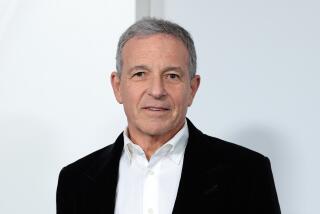Disney Heir Testifies Milken Helped Him Get Financing for Bid
- Share via
Roy E. Disney revealed in testimony Tuesday that “junk bond” king Michael Milken helped put together financing for a hostile takeover of Walt Disney Co. that the Disney heir was considering in 1984.
The son of Disney co-founder Roy O. Disney said he decided not to pursue the acquisition mainly because the estimated $2.5-billion cost would have meant selling parts of the historic firm. He further testified that he allowed Milken to take the plan elsewhere. Shortly afterward, corporate raider Saul P. Steinberg mounted a bid for the company with the aid of Milken and Drexel Burnham Lambert.
The testimony came in the trial of a class-action lawsuit by Disney shareholders alleging that the company, its directors and Steinberg breached their fiduciary duty when the film and theme park company bought Steinberg’s 11% stake at above-market prices. The alleged “greenmail” payment resulted in a $59-million profit for Steinberg. Shortly after the transaction, Disney, who had resigned from the board earlier that year, rejoined the company as a vice chairman.
Disney, the first witness in the trial, disclosed behind-the-scenes events that were the subject of much conjecture in June, 1984.
Among other things, Disney also divulged that:
* He wrote the board a resignation letter in March, 1984, saying he had “deep and unreconcilable philosophical differences” with the management team led by Ronald W. Miller, a son-in-law of the late Walt Disney.
* He sent a $350-million offer to Steinberg to buy the film business from Walt Disney Co. if Steinberg succeeded in acquiring the company. Nevertheless, he said he objected to the buyout of Steinberg as “outrageous.”
* As the board was preparing to respond to Steinberg’s announced offer, it turned down an 11th-hour suggestion by Roy E. Disney for a leveraged buyout by Disney family members, including Miller.
Roy E. Disney’s testimony also indicated that, without firing a shot himself in the takeover battle or risking his fortune, he attained power in Walt Disney Co., helped oust the old management and elect a new management team headed by Michael D. Eisner in September, 1984. Within two years, the company’s stock price had increased several hundred percent, the jury was told. Disney conceded that he had been hesitant to mount a takeover himself because he would have had to borrow heavily to increase his holding in the company.
J. Michael Hennigan, attorney for the shareholders, brought out that the witness had strenuously opposed a major Disney acquisition by the Miller management in fighting Steinberg.
Roy E. Disney said he still does not think the swapping of new Disney stock for Arvida Corp., a Florida real estate concern, was good for the company’s stockholders.
He also gave all credit to the Eisner team for the firm’s success, rather than the farsightedness attributed to old management by defense lawyers in opening statements.
Under questioning by another plaintiffs’ lawyer, William Lerach, the witness said he thought the buyout of Steinberg was unfair to stockholders and caused the market price of Disney stock to plunge afterward.
However, he told defense attorney Michael Diamond that he viewed Steinberg’s offer as inadequate. He confirmed that he bought large amounts of Disney stock after the price fell June 12 because the long-term value was “clearly” greater than the market price.
More to Read
The biggest entertainment stories
Get our big stories about Hollywood, film, television, music, arts, culture and more right in your inbox as soon as they publish.
You may occasionally receive promotional content from the Los Angeles Times.










